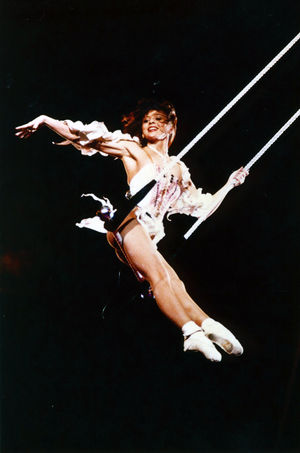Difference between revisions of "Main Page"
From Circopedia
| Line 40: | Line 40: | ||
==New Videos== | ==New Videos== | ||
| + | * [[Crocksons_Video_(1969)|The Crocksons]], comedy tumbling (1969) | ||
* [[Crystalle_Video_(2016)|Crystalle]], tight wire (2016) | * [[Crystalle_Video_(2016)|Crystalle]], tight wire (2016) | ||
* [[Ferkos_Video_(1969)|The Ferkos]], Russian swing (1969) | * [[Ferkos_Video_(1969)|The Ferkos]], Russian swing (1969) | ||
* [[Kroplin_Video_(1969)|Klaus Kröplin]], small animal act (1969) | * [[Kroplin_Video_(1969)|Klaus Kröplin]], small animal act (1969) | ||
* [[Alexis_Sisters_Video_(1987)|The Alexis Sisters]], hand-to-hand balancing (1987) | * [[Alexis_Sisters_Video_(1987)|The Alexis Sisters]], hand-to-hand balancing (1987) | ||
| − | |||
==New Oral Histories== | ==New Oral Histories== | ||
Revision as of 02:51, 7 June 2023
|
In The Spotlight
ELENA PANOVA
Elena Panova is credited with having originated a new swinging trapeze style and technique, which she developed quite by accident at Moscow's State College for Circus and Variety Arts, along with her teachers, Tereza Durova and Victor Fomine. When it was presented for the first time in the West in 1987 (it was at a time when communist Eastern Europe was still secluded), her act was a sensation that triggered the creation of a string of new swinging trapeze acts in a similar style, notably in Canada.
Elena Panova was born Elena Nikolaevna Borisova on July 18, 1964 in Murom, four hundred kilometers from Moscow, the third daughter of Nikolai Borisov and his wife, Klavdia, née Kazanskaya. Her parents had nothing to do with the circus: they came from peasant stock and both worked in a local factory.
Murom is one of Russia's oldest cities, dating back to the 9th century, and "home" to the Kievan Rus folk hero of yore, Ilya Muromets. It is also a Holy City that managed to keep some of its monasteries and convents open during the communist era. Yet, it is a small town, and although the Soviet government gave it a theater building, it didn't have a circus, neither was it important enough to receive the summer visit of a shapito (or chapiteau(French, Russian) A circus tent, or Big Top. in French—a traveling circus). In fact, Elena never saw a live circus performance while growing up.
She did see circus shows on television, however, as well as ballet performances, and in her early teens, she enrolled herself in her school's amateur dance company. Meanwhile, a friend of hers had joined the local "Circus Club" and suggested that Elena, who was then fourteen, came with her. "Circus Clubs" were the Soviet equivalent of European or American youth circuses, though generally at a much higher level in terms of the training they provided. They flourished in the Soviet Union, where circus arts were held in high esteem.
During these years, Elena trained in basic acrobatics, but her tastes drew her to aerial apparatuses; while still at the Circus Club, she and a fellow student developed a "bambou(French - Russian: Bambuk) Aerial apparatus, generally a hanging perch, from where the performers hang with the help of hand or ankle loops. See also: Aerial perch." (aerial perchA hanging perch, from where the performers hang with the help of hand or ankle loops. (French: Bambou - Russian: Bambuk)) act. Her performance debut came in April 1978, when she presented a static trapeze act in the Easter show the Circus Club staged in Murom’s Grand Theatre.... (more...)
New Essays and Biographies
- Jo-Ann Jennier, Aerialist, Animal Trainer
- Ethel Jennier, Aerialist, Animal Trainer
- Walter Jennier, Sea Lion Trainer
- Rex Williams, Elephant Trainer
- Little Billy Merchant, Clown
New Videos
- The Crocksons, comedy tumbling (1969)
- Crystalle, tight wireA tight, light metallic cable, placed between two platforms not very far from the ground, on which a wire dancer perform dance steps, and acrobatic exercises such as somersaults. (Also: Low Wire) (2016)
- The Ferkos, Russian swingGiant swing used to propel flyers into acrobatic figures onto the shoulders of a catcher, on a crash mat, or into a net. (1969)
- Klaus Kröplin, small animal act (1969)
- The Alexis Sisters, hand-to-handAn acrobatic act in which one or more acrobats do hand-balancing in the hands of an under-stander. balancing (1987)
New Oral Histories
- For A Moment You Fly, The First Season of The Big Apple Circus (1977)
- Vladimir Durov Documentary on Russian Television (c.2000)
- Dolly Jacobs Interview at The Ringling (2018)
- Pinito del Oro's Interview on Spanish Television (1970)
- Gia Eradze's Interview on SSU TV (2015)
Circopedia Books
- Philip Astley & The Horsemen who invented the Circus, by Dominique Jando (2018)
A Message from the Founder
CIRCOPEDIA is a constantly evolving and expanding archive of the international circus. New videos, biographies, essays, and documents are added to the site on a weekly—and sometimes daily—basis. Keep visiting us: even if today you don't find what you're looking for, it may well be here tomorrow! And if you are a serious circus scholar and spot a factual or historical inaccuracy, do not hesitate to contact us: we will definitely consider your remarks and suggestions.
- Dominique Jando
- Founder and Curator
